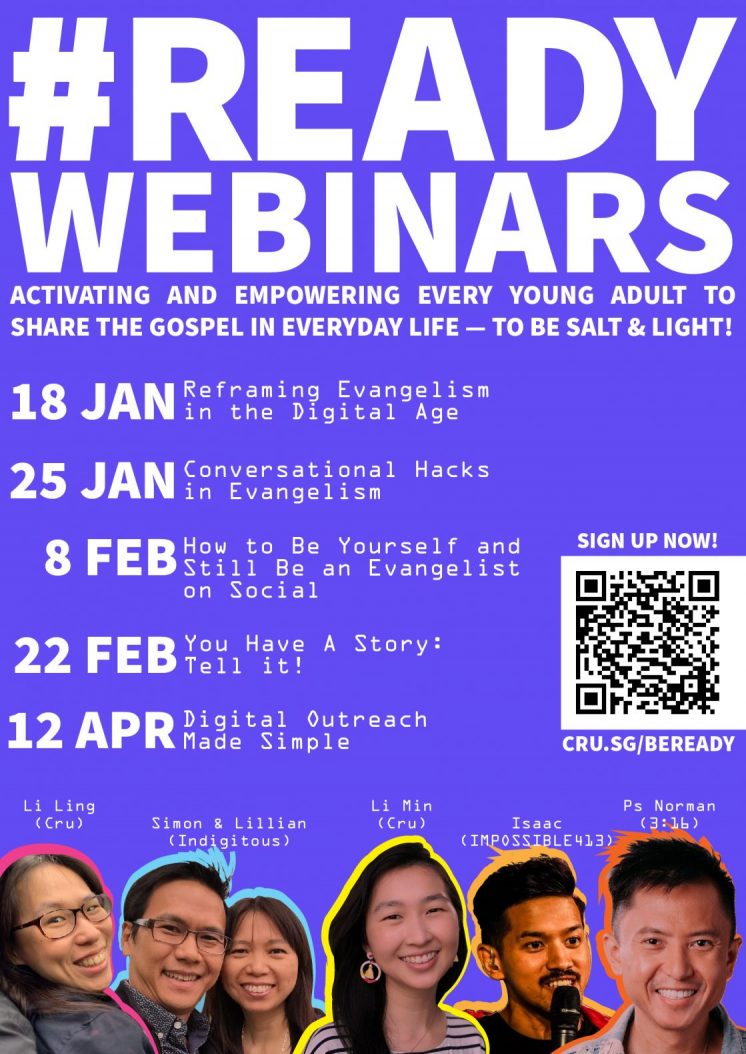Graceworks has been putting out some of the most accessible and insightful pieces I’ve seen recently when it comes to understanding how different generations within the church view issues like attending physical services.
In case you haven’t heard, The Generations Project is a study that aims to improve the unity within our churches by increasing empathy between the different generations.
I highly recommend absorbing their latest reflection pieces on evangelism.
If my guesswork and Google-fu are up to scratch, then it’s worth noting that the first article is written by a Millennial (Ho Wei-Hao), while the second is by a Baby Boomer (Rev Tan Soo-Inn).
But as a Millennial myself, allow me to share some personal takeaways from a few of the key findings that stood out.
ARE WE EFFECTIVE AT EVANGELISM?
In Ho’s article, he began by offering a sobering look at the state of evangelism based on the latest census.
“… within the period of 2010 to 2020, those in the age ranges of 25 to 34 and 35 to 44 years old had the highest rate of increase of residents with no religious affiliation and were also the only age groups that saw a decrease in the proportion of Christians.”
Against that worrying backdrop, Ho then narrowed in on the possible reasons why evangelistic efforts to the young had not been effective in the last decade.
He observed that generations before Millennials (1981-1996) were more used to evangelism looking like telling people about the gospel through street evangelism or evangelistic events.
In other words, gospel transmission could be said to have been more information-based in the past, with Ho noting how tools like the 4 Spiritual Laws were methods commonly relied on.
The spiritual landscape in 2022, however, has “changed dramatically with the younger generations who now live in an age where technology has taken away the need for pure knowledge transference”.
That certainly resonates with my experience.
EVERGREEN MESSAGE, EVOLVING METHODS
Many young people frequently get their answers (and truths) from Google or online communities. It’s not enough to just know what the gospel is anymore – even non-believers have access to the required knowledge.
What those in our generation need to know is how the gospel looks in the real world.
In fact, Graceworks found that in their quantitative survey*, the top three trends that Millennials identified with the most were “the narrow vision and work of most churches”, “the increasing irrelevance of churches” and “the overstructured and overprogrammed church”.
 In his commentary, Ho cited one of the reasons why the influence of the Church has declined in the public sphere among the young:
In his commentary, Ho cited one of the reasons why the influence of the Church has declined in the public sphere among the young:
“The lop-sided emphasis of just sharing the gospel without noticeable efforts in areas like caring for the needy and creation care has been perceived as hypocrisy and a gospel that has no relevance for life.”
In my own experience, I have listened to sermons on why we shouldn’t waste time taking care of the world since Jesus is coming back. While it is true that we are citizens of heaven and that this present earth is not our home, that sort of message comes across as tone-deaf.
(If you’d like to know more about what the gospel has to do with the physical environment, read Rev Tan’s reflections.)
The point is: When we consider that our generation has grown up with the prevailing sense that the world is on fire (the sixth mass extinction is apparently already underway) with virus variants and dying ecosystems, it’s little wonder pulpits that neglect creation care or disdain climate change can leave the young with the impression that religion is a relic of the past.
HOW IS THE GOSPEL RELEVANT TODAY?
Well, if you find yourself thinking like I did, you might actually be a Millennial who would fall under the archetype of The Visionaries, as they believe that loving God means caring for what He cares about.
Oh, I better explain that: In an attempt to communicate the common mindsets that each generation has, Graceworks has come up with seven archetypes after conducting qualitative interviews.
Here’s the list for Generation Y (Millennials):
 Obviously these archetypes are not fully representative of all Millennial Christians in Singapore and are not mutually exclusive of one another.
Obviously these archetypes are not fully representative of all Millennial Christians in Singapore and are not mutually exclusive of one another.
Indeed, I think it’s reasonable to say that there would ultimately be some overlap among the archetypes. For example, I think I resonate most with the Bona Fides category as someone who longs for authentic community.
Anyway, just treat this as a really handy tool for a generational snapshot, so go peep it if you like.
The old adage that we’ve all heard before continues to ring true: “People don’t care how much you know until they know how much you care.”
Caring for the lost and the least, being communities of radical compassion were what set the early church apart. How would that look like in our generation?
Love is attractive, which is why I believe one way people will perceive the relevance of the gospel is by seeing compassion in action for the pressing needs of today.
AN UPHILL BATTLE AGAINST PUBLIC PERCEPTION
Unfortunately, some impressions prove very hard to shake.
Some of my loved ones still bring up the moral failings of leaders from years ago. Every other week, it seems like there are reports of some high-profile apostasy or failure. I really wonder how it makes us look.
Ho makes this salient point based on the responses from their study too:
“The church’s response in the public sphere on issues like LGBTQ+, gender equality, and mental health has resulted in people perceiving the church as legalistic and lacking in compassion.”
It makes me wonder what my non-Christian friends really think about the Church – because I hold some degree of responsibility for that perception.
In his commentary, Ho writes:
“For the younger ones, it feels (whether rightly or wrongly) like they must overcome a mountain of negative impressions and misconceptions before they can even reach a neutral ground to explore the issue of God and faith with their friends. Without help, many younger believers are choosing to avoid this difficult conversation.”
The more I think about it, the more I think repentance is required for some of these mistakes we’ve made along the way.
But I don’t really know where to start when it comes to penance – something I suspect is on many a young Christian mind as well.
WHAT IS THE CHURCH?
To that end, I think the gospel must ultimately be lived out through meaningful relationships within a spiritual community.
I find myself resonating most with the Bona Fides archetype, since God has put a need and a desire to see something genuine in my spiritual relationships.
I’m trying to move past the hi-bye sort of relationships I am used to, in hopes of finding brothers and sisters with whom I can walk through life together.
In an age where younger people are becoming increasingly disconnected, we really need to rethink how we can engage our generation (and the ones beyond) for Christ.

The opportunity to meet the need for belonging is something that Rev Tan also writes about in his article:
“One of the key attractions of the early church was that it was a community where people sacrificially loved one another. The depth of the love in the Christian community was one of the key reasons why people were attracted to the faith. The power of a community that provides true belonging is still a key way we flesh out the gospel, especially in a world where conflict is everywhere and so many are lonely.
The world doesn’t need the church for big, flashy events, but we hunger for true belonging. The gospel reaches out to individuals but it is not individualistic. Evangelism is not just offering people a ticket to heaven when they die. A decision to follow Jesus puts us in communion with God and into a community today, where there is deep and real belonging.”
Indeed, Rev Tan notes that “evangelism must start with the offer of genuine friendship to people we want to reach for Christ”.
I’m inclined to agree. After all, that was what Jesus Himself did.
I wonder if we dare to shake up structures and systems in favour of simple friendship, rather than slogans and formulas of yesteryear. People before programmes.
As a generation, we can offer others opportunities to see Jesus moving in our lives.

WHERE DO WE GO FROM HERE?
“Uncharted waters” is the phrase that comes to mind when I consider the challenges that lay before our generation when it comes to evangelism.
What I was especially encouraged by, however, was an observation Ho made honouring the decisions made and prices paid by older believers when they first chose Jesus.
“Many of them had to grapple with the anger of their non-Christian parents/close ones who saw their conversion as a form of betrayal,” noted Ho.
Many of these older believers are our parents and elders in church. Many of their children — us — are now the ones at crossroads, figuring out what evangelism will look like in the decade ahead.
Amid the backdrop of a COVID-touched world, I believe there is a shaking going on in the Church today. We have to answer these big questions and figure out what our faith really means to us.
Christianity isn’t quite as comfortable as it once was. But that’s not a bad thing.
The encouragement here is that we’re not alone as we go through this. We have each other and, most importantly, we have Christ.
Let’s take heart from our forebears’ examples. Bold faith is needed from us — young Christians in Singapore — now just as it has been for the generations before us.
Above all, let’s take heart from Jesus. If we obey Him, He promises to be with us to the end of the age.
*The quantitative survey was designed primarily to validate the insights gleaned from their qualitative survey. It should not be interpreted or used independently apart from what had been documented about each trend. For access to the full report, you can get in touch with [email protected].
Want to contribute to this study? Graceworks is also inviting more Millennials (26–41 years old in 2022) to fill out their quantitative survey to help them improve the accuracy of their insights. You can participate here!
Finally, if you’re younger than our writer (not Millennial), you can read a fellow Gen Z Christian’s reflection below.
- When was the last time you shared the gospel with someone?
- What are some of the barriers you currently face?
- How do you think we (the Church) can become more effective in evangelism?
- If you’d like to be equipped in this area, check out this series of webinars organised by Cru.










